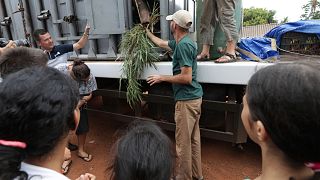Central African Republic
In a fight to revive a rare cultural heritage and heal a nation scarred by conflict a Central African Republic band and dancers are trying to revamp the country's traditional music and dance style - known as "Motenguene".
Its name translates into "the dance of the caterpillars," and was handed down by the Pygmies, who gathered for food in ancestral forests in the southwest.
In the capital Bangui, the band Zokela gets the audience on its feet with its jangle of guitars.
It is one of four such traditions in the CAR, along with the "bird dance" from the north, the "fish dance" of the southeast and the "savannah dance" of central regions.
Zokela have been trying to revamp Motenguene's image for nearly 30 years.
In their shows, traditional bead necklaces and antelope skins are usually swapped for city-slicker clothes, while the kora -- a delicate, long-necked harp lute favoured in much of West Africa -- has given way to the electric guitar.
Social fabric
"We are using this dance to distinguish ourselves a bit from our brothers in Congo, Ivory Coast and Cameroon," Saint-Pierre Dibaba Alagomme, the founder of Zokela, tells AFP.
Keeping the sound alive is also vital to the country's social fabric,
The CAR has been ravaged by decades of violence, corruption and nepotism.
In 2013, a coalition of armed groups from the Muslim minority ousted president Francois Bozize, plunging the country into a maelstrom of communal bloodshed.
But the musicians have another battle to fight.
For all the lively rhythms, it's difficult for the music to survive as concerts are poorly paid.
The CAR has no professional record industry and musicians must make do with the meagre fees from playing clubs and private functions such as weddings.
These events bring an average income equivalent to 75 euros (about $90) to be shared by 12 to 15 people.
Royalties
Recordings made in local studios are also considered too amateur for export. To make matters worse, professional musicians are also owed copyright fees dating back over 30 years.
"It is our duty to promote this sector of activity, but there is one thing that must also be recognised, and that is that artists and cultural actors as a whole, are not receiving their royalties," says cultural promoter Yvon Eka.
"Culture is the identity of a country. The crisis that the Central African Republic is going through today is cultural."
This year, The government drew up a national cultural policy to help.
"We started with the realisation that the public consumes a lot more products from abroad, because there is no promotion of Central African culture as such," says Philippe Bokoula, director general of the ministry of arts and culture.
In July, a law was passed to make the Bucada operational.
"The major part of the finance will come from the state, while we spread awareness among the radio stations and consumers and draw up charts with a scale of tariffs," Bokoula says.
Yet, the initiative -- awaited for decades -- remains in limbo, pending the publication of a government decree to make it operational.











02:35
Central African Republic's major rebel groups to disarm, dissolve
01:24
French parliament votes to return sacred "talking drum" to Ivory Coast
02:20
In Morocco, women keep the art of traditional rug-weaving alive
Go to video
Paraguayan town celebrates vibrant Kamba Ra'anga festival with masks, fire and tradition
02:20
In Brazil, knights and masked riders take to a football pitch for religious festival
Go to video
'Noradala': Centuries-old fishing festival in Guinea still going strong